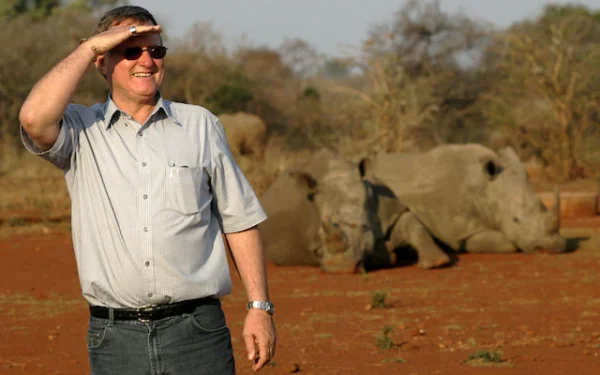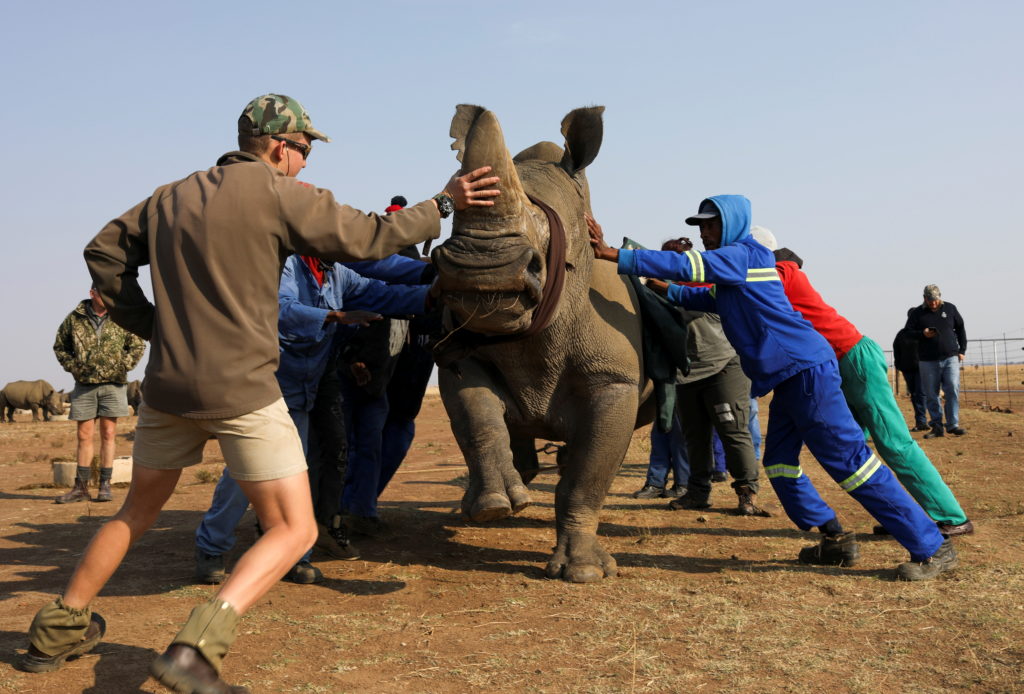A prominent South African rhino breeder is accused of leading a $14.1M horn-smuggling ring. Learn how this impacts wildlife crime.

A Symbol of Strength Betrayed
The rhino, a symbol of strength and resilience, is once again in danger. But this time, the threat doesn’t come from shadowy poachers hiding in the bush. It comes from a man once trusted to protect them. South African authorities say a well-known breeder, John Hume, may have led a massive $14 million horn smuggling operation.
The Accusation at a Glance
Investigators spent seven years uncovering the case. The findings are staggering.
- Who: John Hume, 83, one of South Africa’s largest rhino breeders, and five accomplices.
- What: Allegedly smuggled 964 rhino horns worth $14.1 million.
- How: Authorities say they used fake permits to bypass trade bans. While local trade is legal, international trade is strictly banned under CITES.
- Charges: The group faces 55 charges, including racketeering, theft, fraud, and money laundering.
For now, Hume and others are out on bail, but they must appear in court again on December 9, 2025.
Why It Matters
Rhinos are one of Earth’s oldest and most iconic species. South Africa is home to nearly 18,000 rhinos, the largest population in the world. Yet they remain under constant threat.
In just the first three months of 2025, 103 rhinos were illegally killed. Each horn lost means more than money—it means a broken ecosystem, a fractured heritage, and a future slipping away.
Communities who rely on rhino tourism also pay the price. Jobs vanish. Trust in conservation laws fades. And once again, the innocent animals suffer most.
The Human Element
This is not just a story about numbers and money. It is about betrayal. People trusted breeders like Hume to safeguard rhinos, not exploit them. When that trust is broken, it undermines global conservation efforts.
For many, rhinos are more than animals. They are part of their culture, identity, and pride. This crime takes away from humanity as much as from nature.
Global Context and Connections
Wildlife crime is not local—it is global. Rhino horns are in high demand in parts of Asia, sometimes priced like gold. Smuggling networks thrive when international cooperation is weak.
This mirrors other global environmental failures. Recently, global talks on plastics fell apart. Read more here: Geneva Talks Fail – Global Plastics Treaty Still Out of Reach. Just like plastics, wildlife protection also depends on strong global agreements.
And nature’s fury reminds us daily of the urgency. For example, Hurricane Erin 2025 – Latest Path, Impact, and Human Stories shows how communities are already suffering from climate extremes.
To follow worldwide updates on conservation and crime, visit America112.
What Comes Next?
The case against John Hume will likely set the tone for future wildlife crime trials. If proven guilty, it could push governments to enforce stricter rules against smuggling networks, even those hidden behind legal operations.
The outcome will matter not just for rhinos, but for all endangered species.
What You Can Do
Every person can play a role in stopping this tragedy.
- Support trusted conservation groups. Donate or volunteer with organizations fighting poaching.
- Avoid illegal wildlife products. Say no to rhino horns, ivory, or any trade in endangered animals.
- Raise awareness. Share these stories. The more people know, the harder it is for smugglers to hide.
- Push for stronger laws. Support international cooperation and demand accountability.
- Live eco-friendly. Protecting rhinos also means protecting the planet. Learn how global agreements fail here: Geneva Talks Fail – Global Plastics Treaty Still Out of Reach.
A Final Word
The rhino’s story is our story. Each horn stolen is a wound not just to wildlife, but to humanity itself. We are at a crossroads—either we let greed win, or we stand for life.
The choice is ours.


One Reply to “When Greed Destroys Nature: The $14M Rhino Horn Scandal”